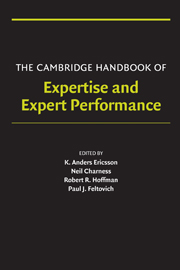Book contents
- Frontmatter
- Contents
- Acknowledgments
- Contributors
- PART I INTRODUCTION AND PERSPECTIVE
- PART II OVERVIEW OF APPROACHES TO THE STUDY OF EXPERTISE – BRIEF HISTORICAL ACCOUNTS OF THEORIES AND METHODS
- PART III METHODS FOR STUDYING THE STRUCTURE OF EXPERTISE
- PART IV METHODS FOR STUDYING THE ACQUISITION AND MAINTENANCE OF EXPERTISE
- PART V DOMAINS OF EXPERTISE
- PART VI GENERALIZABLE MECHANISMS MEDIATING EXPERTISE AND GENERAL ISSUES
- 34 A Merging Theory of Expertise and Intelligence
- 35 Tacit Knowledge, Practical Intelligence, and Expertise
- 36 Expertise and Situation Awareness
- 37 Brain Changes in the Development of Expertise: Neuroanatomical and Neurophysiological Evidence about Skill-Based Adaptations
- 38 The Influence of Experience and Deliberate Practice on the Development of Superior Expert Performance
- 39 Development and Adaptation of Expertise: The Role of Self-Regulatory Processes and Beliefs
- 40 Aging and Expertise
- 41 Social and Sociological Factors in the Development of Expertise
- 42 Modes of Expertise in Creative Thinking: Evidence from Case Studies
- Author Index
- Subject Index
- References
39 - Development and Adaptation of Expertise: The Role of Self-Regulatory Processes and Beliefs
from PART VI - GENERALIZABLE MECHANISMS MEDIATING EXPERTISE AND GENERAL ISSUES
- Frontmatter
- Contents
- Acknowledgments
- Contributors
- PART I INTRODUCTION AND PERSPECTIVE
- PART II OVERVIEW OF APPROACHES TO THE STUDY OF EXPERTISE – BRIEF HISTORICAL ACCOUNTS OF THEORIES AND METHODS
- PART III METHODS FOR STUDYING THE STRUCTURE OF EXPERTISE
- PART IV METHODS FOR STUDYING THE ACQUISITION AND MAINTENANCE OF EXPERTISE
- PART V DOMAINS OF EXPERTISE
- PART VI GENERALIZABLE MECHANISMS MEDIATING EXPERTISE AND GENERAL ISSUES
- 34 A Merging Theory of Expertise and Intelligence
- 35 Tacit Knowledge, Practical Intelligence, and Expertise
- 36 Expertise and Situation Awareness
- 37 Brain Changes in the Development of Expertise: Neuroanatomical and Neurophysiological Evidence about Skill-Based Adaptations
- 38 The Influence of Experience and Deliberate Practice on the Development of Superior Expert Performance
- 39 Development and Adaptation of Expertise: The Role of Self-Regulatory Processes and Beliefs
- 40 Aging and Expertise
- 41 Social and Sociological Factors in the Development of Expertise
- 42 Modes of Expertise in Creative Thinking: Evidence from Case Studies
- Author Index
- Subject Index
- References
Summary
The attainment of expertise in diverse fields requires more than nascent talent, initial task interest, and high-quality instruction; it also involves personal initiative, diligence, and especially practice. Both the quality and quantity of an expert's practice have been linked directly to acquisition and maintenance of high levels of performance (Ericsson, 1996, Ericsson, Chapter 38). Regarding its quality, the practice of experts is characterized by its conscious deliberate properties – namely, a high level of concentration and the structuring of specific training tasks to facilitate setting appropriate personal goals, monitoring informative feedback, and providing opportunities for repetition and error correction (Ericsson, Krampe, & Tesch-Römer, 1993). Deliberate attention (i.e., strategic awareness) is believed to be necessary to overcome prior habits, to self-monitor accurately, and to determine necessary adjustments.
Although a skilled teacher typically structures these desirable dimensions of practice episodes, a student must implement them on his or her own before returning to the teacher for evaluation and new assignments. Expert musicians rated both lessons with their teacher and their solitary practice as two keys to their improvement, but only the latter was solely under their control (Ericsson, Krampe, & Tesch-Römer, 1993). Interestingly, the quantity of deliberate practice, but not total amount of music-related activity, was predictive of the musicians' acquisition and maintenance of expert performance. Ericsson (2003) has discussed a person's attempts to acquire expertise as deliberate problem solving because they involve forming a cognitive representation of the task, choosing appropriate techniques or strategies, and evaluating one's effectiveness.
Information
- Type
- Chapter
- Information
- The Cambridge Handbook of Expertise and Expert Performance , pp. 705 - 722Publisher: Cambridge University PressPrint publication year: 2006
References
Accessibility standard: Unknown
- 210
- Cited by
